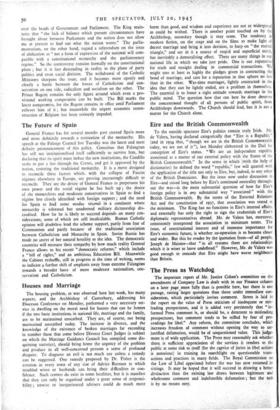The Future of Spain
General Franco has for several months past steered Spain more and more definitely towards a restoration of the monarchy. His speech at the Falange Council last Tuesday was the latest and most definite pronouncement of this policy. Conscious that Falangism has still not institutionalised itself sufficiently to survive him, but declaring that its spirit must imbue the new institutions, the Caudillo seeks to put a law through the Cortes, and get it approved by the nation, restoring the traditional monarchy. It is a move designed to reconcile three factors which, with the collapse of Fascist regimes elsewhere in Europe, are proving increasingly difficult to reconcile. They are the desire of General Franco to perpetuate his own power and the social regime he has built up ; the desire of the monarchists and moderate conservatives in Spain to find a regime less closely identified with foreign support ; and the need for Spain to find some modus vivendi in a continent where monarchy is tolerated but unadorned military dictatorship dis- credited. How far he is likely to succeed depends on many con- siderations, some of which are still incalculable. Roman Catholic opinion will doubtless lend the scheme support,'partly from fear of Communism and partly because of the traditional association between Catholicism and Monarchy in Spain. Soviet Russia has made no secret of her natural hostility to the idea. The democratic countries will measure their sympathy by how much reality General Franco allows to his recent "democratic reforms," which include a " bill of rights," and an ambitious Education Bill. Meanwhile the Cabinet reshuffle, still in progress at the time of writing, seems to indicate a further shift of emphasis away from extreme Falangism towards a broader basis of more moderate nationalism, con- servatism and Catholicism.


























 Previous page
Previous page